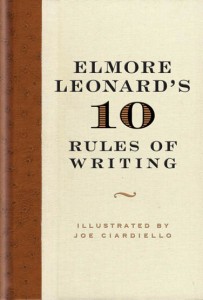
Inspired by Elmore Leonard’s 10 Rules of Writing, the Guardian recently asked several contemporary authors for their own rules of writing. Writers such as Margaret Atwood, Annie Proulx, Jonathan Franzen, Philip Pullman, Zadie Smith, and many others answered the call ((Here’s Part One; and here’s Part Two).
You may have noticed that at Fiction Writers Review, we take our rules with a pinch of skepticism. (Steven Wingate’s Quotes & Notes series has investigated some of the “rules” embodied in writing-related quotes.) But writing is a hard job, and we all long for the magic formula that will help us get it done. So it’s hard not to be swayed by firm, concrete advice like this:
Diana Athill: You don’t always have to go so far as to murder your darlings – those turns of phrase or images of which you felt extra proud when they appeared on the page – but go back and look at them with a very beady eye. Almost always it turns out that they’d be better dead. (Not every little twinge of satisfaction is suspect – it’s the ones which amount to a sort of smug glee you must watch out for.)
Margaret Atwood: You can never read your own book with the innocent anticipation that comes with that first delicious page of a new book, because you wrote the thing. You’ve been backstage. You’ve seen how the rabbits were smuggled into the hat. Therefore ask a reading friend or two to look at it before you give it to anyone in the publishing business. This friend should not be someone with whom you have a romantic relationship, unless you want to break up.
Roddy Doyle: Do keep a thesaurus, but in the shed at the back of the garden or behind the fridge, somewhere that demands travel or effort. Chances are the words that come into your head will do fine, eg “horse”, “ran”, “said”.
Geoff Dyer: Have regrets. They are fuel. On the page they flare into desire.
Anne Enright: Description is hard. Remember that all description is an opinion about the world. Find a place to stand.
Jonathan Franzen: Never use the word “then” as a conjunction – we have “and” for this purpose. Substituting “then” is the lazy or tone-deaf writer’s non-solution to the problem of too many “ands” on the page. [Ed. Note: Having heard Franzen expound on this at length, in person, I can tell you that he’s not joking at all here.]
AL Kennedy: Remember you love writing. It wouldn’t be worth it if you didn’t. If the love fades, do what you need to and get it back.
Hilary Mantel: If you get stuck, get away from your desk. Take a walk, take a bath, go to sleep, make a pie, draw, listen to music, meditate, exercise; whatever you do, don’t just stick there scowling at the problem. But don’t make telephone calls or go to a party; if you do, other people’s words will pour in where your lost words should be. Open a gap for them, create a space. Be patient.
FWR readers, tell us: What are your “rules” for writing? What are the best writing do’s and don’ts you’ve encountered?





